八年级下册状语从句讲解及练习汇编
Unit6-条件状语从句讲练结合人教版八年级英语下册

条件状语从句知识提炼一、连接词:if/unless/ as long as(只要)If 意为“如果”,unless意为“除非”相当于if not二、时态:主将从现、主情从现、主祈从现e.g.(1) If people obey the traffic rules, there will be fewer accidents. 主将从现(2) If we break the traffic rules, we may get a fine. 主情从现(3) What shall we do if it snows tomorrow? 主将从现(4) Don’t leave the building unless I tell you to. 主祈从现(5) He won’t be late unless he is ill. 主将从现三、注:if 译为“是否”时引导宾语从句时态区分时态(if引导宾语从句):主现从随①I don’t know what the teacher said yesterday.②I think that you can ask teacher for help.③I believe that you will pass the exam.主过从过My mother asked me what the result was.真理永现My teacher told us that the earth moves around the sun.四、在so和neither的倒装句中的使用Eg: If you don’t go to school, neither will I. (主将从现)小牛试刀➢单项选择() 1. Do you know when he will e back tomorrow?Sorry, I don't know. When he ______ back, I'll tell you.A. esB. will eC. eD. may e() 2. Mary will go to Sanya if she ______ a fivedaytrip.A. haveB. hadC. will haveD. has() 3. What will you do if you ______ to the party without invitation?A. goB. wentC. goingD. will go() 4. If I eat too much food, I _____ too fat.A. amB. wasC. willD. will be() 5. I'll give the book to him if he ______ here next Sunday.A. will eB. esC. is ingD. came答案:ADADB➢用所给词的适当形式填空1. If you ________(feel) tired, you _________ (have) to have a rest.2. Where ________ he ________ (see) the film if he _________(have) time?3. If there ________ (be) fewer trees, there ________ (be) more pollution.4. He ________ (dress) more casually if he ________ (not work) on weekends.5. If Marcia ________ (live) alone, she ________ (keep) a pet parrot.6. Lana ________ (buy) a new dress if the old one ________ (be) out of style.7. The twins ________ (fight) if they________ (argue).8. I ________ (have) a bake sale if I ________ (need) money for education.9. Peter ________ (send) me a beautiful souvenir if he ________ (go) to Spain.10. If Mr. Green ________ (say) I am hard working, my parents ________ (feel)glad.11. I ________ (go) to the beach if it ________ (not rain) this week.12. ________they ________ (have) a match if the P.E. teacher________ (be) not busy?13. He ________ (write) a letter to his grandparents if he ________ (get) hisreport card this week.14. If she ________ (get) up late, she ________ (not catch) the early bus.15. Peter ________ (major) in English if he ________ (pass) the exams in PekingUniversity.16. If it rains tomorrow, I _______ (stay) at home.17. He will take a trip to Beijing if he ________ (be not) busy next week.18. Please tell Li Jun about it if he _______ (e) back19. If you don't wear your school uniform to the party the teachers __________(not let) you in.20. She __________ (not go) shopping with her parents if it snows this afternoon. 答案:1. feel; will have 2. will; see; has 3. are; will be4. will dress; doesn’t work5. lives; will keep6. will buy; is7. will fight; argue 8. will have; need 9. will send; goes10. says; will feel 11. will go; doesn’t rain 12. Will; have; is13. will write; gets 14. gets; won’t catch 15. will major; passes16. will stay 17. isn’t18 es 19.won’t let20.won’t go➢完成句子1.如果他迟到了,会发生什么事情?What _______ ________ if he _______ late?2. 如果努力学习,你就会取得好成绩。
状语从句讲解及练习
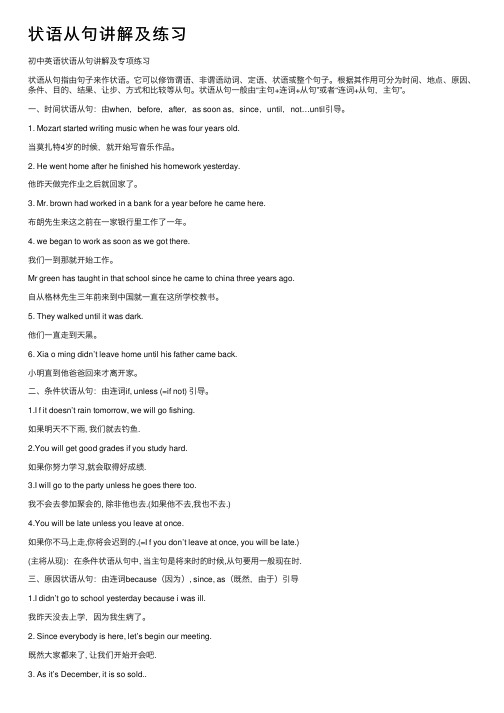
状语从句讲解及练习初中英语状语从句讲解及专项练习状语从句指由句⼦来作状语。
它可以修饰谓语、⾮谓语动词、定语、状语或整个句⼦。
根据其作⽤可分为时间、地点、原因、条件、⽬的、结果、让步、⽅式和⽐较等从句。
状语从句⼀般由“主句+连词+从句”或者“连词+从句,主句”。
⼀、时间状语从句:由when,before,after,as soon as,since,until,not…until引导。
1. Mozart started writing music when he was four years old.当莫扎特4岁的时候,就开始写⾳乐作品。
2. He went home after he finished his homework yesterday.他昨天做完作业之后就回家了。
3. Mr. brown had worked in a bank for a year before he came here.布朗先⽣来这之前在⼀家银⾏⾥⼯作了⼀年。
4. we began to work as soon as we got there.我们⼀到那就开始⼯作。
Mr green has taught in that school since he came to china three years ago.⾃从格林先⽣三年前来到中国就⼀直在这所学校教书。
5. They walked until it was dark.他们⼀直⾛到天⿊。
6. Xia o ming didn’t leave home until his father came back.⼩明直到他爸爸回来才离开家。
⼆、条件状语从句:由连词if, unless (=if not) 引导。
1.I f it doesn’t rain tomorrow, we will go fishing.如果明天不下⾬, 我们就去钓鱼.2.You will get good grades if you study hard.如果你努⼒学习,就会取得好成绩.3.I will go to the party unless he goes there too.我不会去参加聚会的, 除⾮他也去.(如果他不去,我也不去.)4.You will be late unless you leave at once.如果你不马上⾛,你将会迟到的.(=I f you don’t leave at once, you will be late.)(主将从现):在条件状语从句中, 当主句是将来时的时候,从句要⽤⼀般现在时.三、原因状语从句:由连词because(因为), since, as(既然,由于)引导1.I didn’t go to school yesterday because i was ill.我昨天没去上学,因为我⽣病了。
人教八年级英语下册 Unit 6 条件状语从句语法详解及强化练习

Unit 6 条件状语从句语法详解及练习一、unless引导的条件状语从句unles用作连词,意为“除非;如果不”,引导条件状语从句,若主句为一-般将来时、祈使句或谓语中含有情态动词时,从句常用一-般现在时表示将来。
Nobody will come to the party unless you change the date.如果你不改变日期,没有人会参加聚会。
Don't go out unless your mother allows you.除非你妈妈允许,否则你不要出去。
You can't pass the exam unless you study harder.你如果不更加努力学习,就不能通过考试。
unless通常可与if...not结构进行转换。
I'll go there unless it rains. =I'll go there if it doesn‘ t rain.如果不下雨,我就去那儿。
(2018·吉林)中考链接I sleep with the window open _____ it's really cold.A unlessB tillC or解析:我们可用“句意分析法”解答本题。
unless意为“除非,如果不“;till意为“直到为止”;or意为“或者,否则”。
联系空格前“我开着窗户睡觉”和空格后“天确实冷”并结合选项可知,句意为“除非天确实冷,我都是开着窗户睡觉”。
故选A二、as soon as引导的时间状语从句as soon as意为" 一...就... '',引导时间状语从句。
若主句为一般将来时,从句常用一般现时表示将来。
I will call you up as soon as I return home.我一回到家就给你打电话。
The boy got up as soon as the alarm clock went off.闹钟一响,那个男孩就起床了。
八年级下册状语从句讲解及练习

八年级下册状语从句讲解及练习状语从句是用来修饰主句中的动词、副词和形容词的从句。
根据含义,状语从句可以分为时间状语从句、地点状语从句、条件状语从句、原因状语从句、结果状语从句、比较状语从句、目的状语从句和让步状语从句。
时间状语从句通常由when、as、while、before、after、since、till、until、as soon as等连词引导。
例如,昨天我到学校时正下着大雨。
他正在做作业时电话响了。
在时间状语从句中,通常不使用将来时态,而是使用现在时态表示将来的动作或状态。
例如,我一到纽约就给你打电话。
在带有till或until引导的时间状语从句的主从复合句中,如果主句用肯定式,其含义是“一直到……时”,谓语动词只能用延续性动词。
如果主句用否定式,其含义是“直到……才……”、“在……以前不……”,谓语动词可用瞬间动词。
例如,年轻人看书看到灯灭了。
让我们等到雨停了再走。
条件状语从句通常由if和unless引导。
例如,如果明天下雪了,我们该怎么办?除非我告诉你,否则不要离开大楼。
在条件状语从句中,谓语动词通常使用现在时态表示将来的动作或状态。
例如,如果明天有空,我会帮你学英语。
除非他病了,否则他不会迟到。
祈使句+ and (or)+陈述句”在意思上相当于一个带有条件状语从句的复合句。
例如,赶快,否则你会迟到。
如果你不赶快,你会迟到。
努力研究,你就能通过考试。
If you work hard。
you will XXX.XXX like because。
since。
and as。
For example。
"He didn't come to school because he was ill." As and since are weaker than because and are often used to express XXX "why," only because can be used。
人教版英语八下状语从句讲+练

八下状语从句:一个完整的句子修饰主句中的动词、形容词/副词或这个大句子等,充当状语的成分。
起副词作用的句子(故也叫副词性从句)。
根据其作用可分为时间、地点、原因、条件、目的、结果、让步、方式和比较等从句。
状语从句一般由连词(从属连词)引导,也可由词组引导。
从句位于句首或句中时常用逗号与主句隔开,位于句尾时可以不用隔开。
一:时间状语从句在时间状语从句中,由状语从句表示主句动作发生的时间。
要点:时间状语从句,由以下连词引导:when(在…时), as(当…时), while(在…期间), before(在…之前), after(在...之后), since (自从...以来), not...until(直到…才)until/till(直到…时)等特殊引导词:the minute, the moment, the second,the day,every time,no sooner… than(一...就...), hardly…when(一...就...), as soon as(一…就…)。
在时间状语从句中,要注意时态一致。
一般情况下主句是将来时的时候,从句主要用一般现在时。
当含有否定意义的连接词如:no sooner…than,hardly…when作为引导词且位于句首时,从句要部分(半)倒装。
No sooner did I go to the park,than I saw him waiting for meHardly had we started when it began to rain.No sooner had I arrived home than it began to rain. 我一到家就开始下雨了。
Every time I listen to your advice, I get into trouble. 每当我听取你的建议时,我就会惹上麻烦。
二:原因状语从句由连词because, since, as引导, 也可由now that 等词引导。
人教版英语八年级下册专题重点语法过关:状语从句(期末真题+名校模拟)期末复习查缺补漏冲刺满分含答案
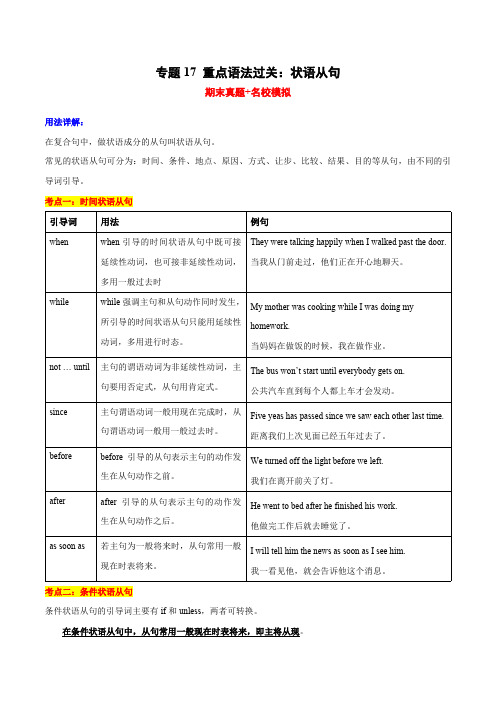
专题17 重点语法过关:状语从句期末真题+名校模拟用法详解: 在复合句中,做状语成分的从句叫状语从句。
常见的状语从句可分为:时间、条件、地点、原因、方式、让步、比较、结果、目的等从句,由不同的引导词引导。
考点一:时间状语从句引导词用法例句when when引导的时间状语从句中既可接延续性动词,也可接非延续性动词,多用一般过去时They were talking happily when I walked past the door.当我从门前走过,他们正在开心地聊天。
while while强调主句和从句动作同时发生,所引导的时间状语从句只能用延续性动词,多用进行时态。
My mother was cooking while I was doing my homework.当妈妈在做饭的时候,我在做作业。
not … until主句的谓语动词为非延续性动词,主句要用否定式,从句用肯定式。
The bus won’t start until everybody gets on.公共汽车直到每个人都上车才会发动。
since主句谓语动词一般用现在完成时,从句谓语动词一般用一般过去时。
Five yeas has passed since we saw each other last time.距离我们上次见面已经五年过去了。
before before 引导的从句表示主句的动作发生在从句动作之前。
We turned off the light before we left.我们在离开前关了灯。
after after 引导的从句表示主句的动作发生在从句动作之后。
He went to bed after he finished his work.他做完工作后就去睡觉了。
as soon as若主句为一般将来时,从句常用一般现在时表将来。
I will tell him the news as soon as I see him.我一看见他,就会告诉他这个消息。
初中英语状语从句讲解、练习与答案

初中英语状语从句讲解、练习与答案状语从句状语从句用来修饰主句中的动词,副词和形容词的从句叫状语从句。
根据其含义状语从句可分为时间状语从句,地点状语从句,条件状语从句,原因状语从句,结果状语从句,比较状语从句,目的状语从句,让步状语从句。
1. 时间状语从句(1)时间状语从句常用when, as, while, before, after, since, till, until, as soon as等连词来引导。
例如: It was raining hard(rain hard 下大雨) when I got to school yesterday. While he was doing his homework, the telephone rang. As he walked along(沿着走) the lake, he sang happily. He had learned a little Chinese before he came to China. After he finished middle school, he went to work in a factory.(2)在时间状语从句里,通常不用将来时态,用现在时态表示将来的动作或状态。
例如:I’ll ring you up as soon as I get to New York.I will tell him everything when he comes back. He won’t believe it until he sees it with his own eyes.(3)在带有till或until引导的时间状语从句的主从复合句里,如果主句用肯定式,其含义是“一直到……时”,谓语动词只能用延续性动词。
如果主句用否定式,其含义是“直到……才……”, “在……以前不……”, 谓语动词可用瞬间动词。
例如:The young man read till the light went out(熄灭).Let’s wait until the rain stops.We won’t start until Bob comes.Don’t get off(从下来) until the bus stops.【Till是指直到某一特定事件发生的时候,而在那个时刻之后,该事情或状况仍将持续。
(word完整版)初二英语时间状语从句讲解与练习
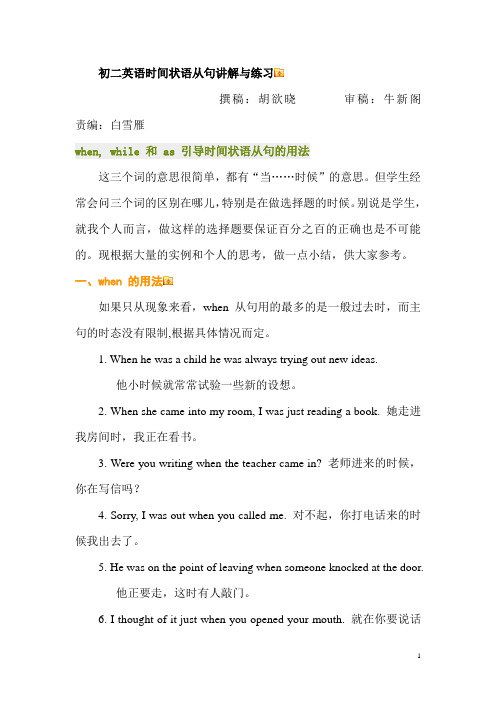
初二英语时间状语从句讲解与练习撰稿:胡欲晓审稿:牛新阁责编:白雪雁when, while 和 as 引导时间状语从句的用法这三个词的意思很简单,都有“当……时候”的意思。
但学生经常会问三个词的区别在哪儿,特别是在做选择题的时候。
别说是学生,就我个人而言,做这样的选择题要保证百分之百的正确也是不可能的。
现根据大量的实例和个人的思考,做一点小结,供大家参考。
一、when 的用法如果只从现象来看,when 从句用的最多的是一般过去时,而主句的时态没有限制,根据具体情况而定。
1. When he was a child he was always trying out new ideas.他小时候就常常试验一些新的设想。
2. When she came into my room, I was just reading a book. 她走进我房间时,我正在看书。
3. Were you writing when the teacher came in? 老师进来的时候,你在写信吗?4. Sorry, I was out when you called me. 对不起,你打电话来的时候我出去了。
5. He was on the point of leaving when someone knocked at the door.他正要走,这时有人敲门。
6. I thought of it just when you opened your mouth. 就在你要说话的时候,我也想到了。
7. I had hardly[scarcely] closed my eyes when someone knocked at the door.我刚一闭上眼,就有人在敲门了。
根据以上的例句,我们可以总结出一点:when 从句的A事件,相当于另一个事件B发生的时间点。
也就是说,when 从句的重点不在动作本身发生的状态,而只是把它作为一个时间点,所以when 多数情况下用的是一般过去时,则不用正在进行时。
初中英语状语从句详细讲解与练习(精华版)

对比训练 1
1. __A__ he heard this, he got very angry.
2. I met Lucy__B__ I was walking along the river.
3. __C__ a child, he lived in the countryside. A. when B. while C. as
4. 表示“随着…..”.常指一个行为是另一个行为的结果。 As she grew older, she became more beautiful.
while:持续性动词 /进行时
1.一般或现在情况
e.g. I like listening to music while I am doing my homework 2.将来. 情况-V一般现在时或现在进行时 e.g.— I’m going to the post office.
won in the end.
A. After B. before C. when D. then
since引导的时间状语从句
1.常译为“自从……”, 2.主句常用现在完成时,从句常用一般过去时。
1.我们自从分手以后一直没见过面。 We haven’t seen each other since we parted. 常用句型:It has been (is) + 时间段 + since从句
-- While you are there, can you get some stamps for me?
3.过去情况
e.g. I hurt my should while I was doing gym.
When: 1.当…的时候 When I was young, I went to town myself. When he receives the letter, he’ll tell us.
(完整版)初中状语从句讲解和练习附答案
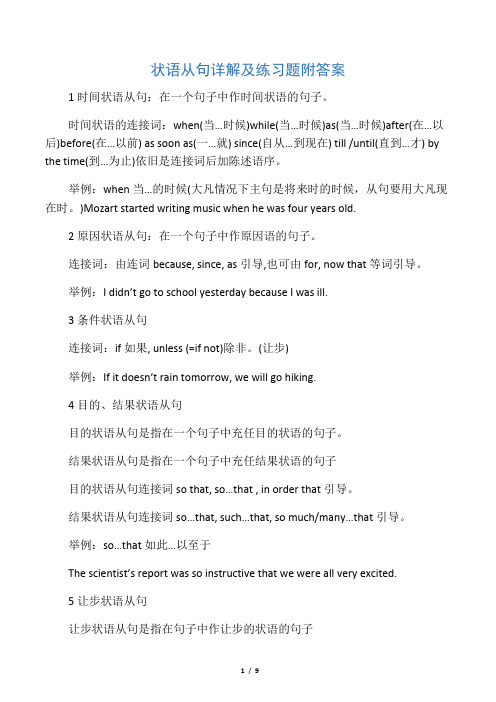
状语从句详解及练习题附答案1时间状语从句:在一个句子中作时间状语的句子。
时间状语的连接词:when(当…时候)while(当…时候)as(当…时候)after(在…以后)before(在…以前) as soon as(一…就) since(自从…到现在) till /until(直到…才) by the time(到…为止)依旧是连接词后加陈述语序。
举例:when当…的时候(大凡情况下主句是将来时的时候,从句要用大凡现在时。
)Mozart started writing music when he was four years old.2原因状语从句:在一个句子中作原因语的句子。
连接词:由连词because, since, as引导,也可由for, now that等词引导。
举例:I didn’t go to school yesterday because I was ill.3条件状语从句连接词:if如果, unless (=if not)除非。
(让步)举例:If it doesn’t rain tomorrow, we will go hiking.4目的、结果状语从句目的状语从句是指在一个句子中充任目的状语的句子。
结果状语从句是指在一个句子中充任结果状语的句子目的状语从句连接词so that, so…that , in order that引导。
结果状语从句连接词so…that, such…that, so much/many…that引导。
举例:so…that如此…以至于The scientist’s report w as so instructive that we were all very excited.5让步状语从句让步状语从句是指在句子中作让步的状语的句子连接词:though, although.,whether…or not举例:Although he is rich, yet he is not happy.状语从句分类1.时间状语从句常用引导词:when, as, while, as soon as, while, before, after, since , till, until分外引导词:theminute,themoment,thesecond,everytime,theday,theinstant,immediately,directly, no sooner … than, hardly …when, scarcely … whenI didn’t realize how special my mother was until I became an adult.While John was watching TV, his wife was cooking.The children ran away from the orchard(果园) the moment they saw the guard.No sooner had I arrived home than it began to rain.Every time I listen to your advice, I get into trouble.2.地点状语从句常用引导词:where分外引导词:wherever, anywhere, everywhereGenerally, air will be heavily polluted where there are factories.Wherever you go, you should work hard.3.原因状语从句常用引导词:because, since, as, since分外引导词:seeing that, now that, in that, considering that, given that, considering that,My friends dislike me because I’m handsome a nd successful.Now that everybody has come, let’s begin our conference.The higher income tax is harmful in that it may discourage people from trying to earn more.Considering that he is no more than 12 years old, his height of 1.80 m is quite remarkable.4.目的状语从句常用引导词:so that, in order that分外引导词:lest, in case, for fear that,in the hope that, for the purpose that, to the end thatThe boss asked the secretary to hurry up with the letters so that he could sign them.The teacher raised his voice on purpose that the students in the back could hear more clearly.5.结果状语从句常用引导词:so … that, so… that, such … that,分外引导词:such that, to the degree that, to the extent that, to such a degree that,He got up so early that he caught the first bus.It’s such a good chance that we must not miss it.To such an degree was he excited that he couldn’t sleep last night.6.条件状语从句常用引导词:if, unless,分外引导词:as/so long as, only if, providing/provided that, suppose that,in case that, on condition thatWe’ll start our project if the president agrees.You will certainly succeed so long as you keep on trying.Provided that there is no opposition, we shall hold the meeting here.7.让步状语从句常用引导词:though, although, even if, even though分外引导词:as(用在让步状语从句中必须要倒装),while (大凡用在句首),no matter …,spite of the fact that, while, whatever, whoever, wherever, whenever, however, whicheverMuch as I respect him, I can’t agree to his proposal.尽管我很尊敬他,我却不同意他的建议。
状语从句讲解及练习题50题-有答案

状语从句1.在主从复合句中修饰主句中的动词,形容词,副词等的从句叫状语从句。
可分为,时间状语从句,地点状语从句,原因,目的,结果,条件,让步,比较和方式状语从句。
2.时间状语从句起时间状语作用的句子;可放在句首,句中和句尾常用引导词:when,while, as, after, before, since, till, until, the moment, hardly … when , no sooner … thanwhen, while, as的用法1)when 用法最广,常可代替while和as, 在while 引导的从句中,动词只能是延续性的When the fire broke out, all the students were sleeping soundly.The telephone rang while I was taking a bath.2)当两个表示时间延续的动作同时发生而又有对比意味的时候,用while,在这样的复合句中,主句从句的时态通常是相同的。
Father was preparing a report while I was playing PC games.3)常用as 的情况:一边…一边;表示随着短暂动作的发生,另一行为伴随发生As he talked on, he got more and more excited.until和till的用法表示“一直到…”时,主句和从句都用肯定式;I will wait until/ till the concert is over.表示“直到…才…”是,主句用否定,从句用肯定式。
They can’t go until Sunday.since的用法since引导的从句中,如果是持续性动词,往往理解为某一状态的终止。
He has written to me frequently since he was ill. 自从他病好以来,他常写信给我。
初中状语从句全面讲解练习题及标准答案
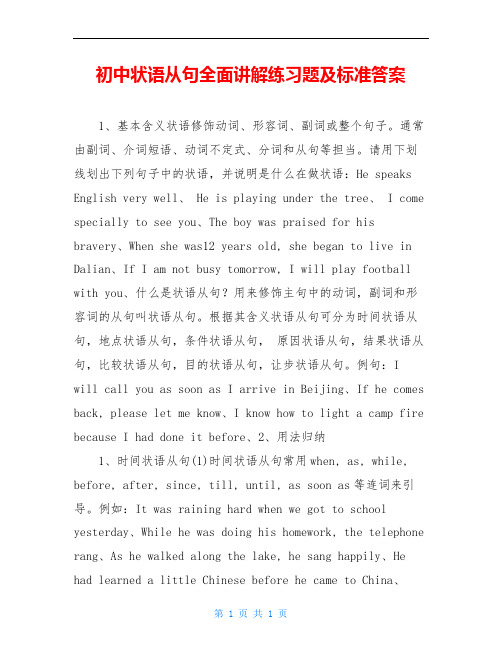
初中状语从句全面讲解练习题及标准答案1、基本含义状语修饰动词、形容词、副词或整个句子。
通常由副词、介词短语、动词不定式、分词和从句等担当。
请用下划线划出下列句子中的状语,并说明是什么在做状语:He speaks English very well、 He is playing under the tree、 I come specially to see you、The boy was praised for his bravery、When she was12 years old, she began to live in Dalian、If I am not busy tomorrow, I will play football with you、什么是状语从句?用来修饰主句中的动词,副词和形容词的从句叫状语从句。
根据其含义状语从句可分为时间状语从句,地点状语从句,条件状语从句,原因状语从句,结果状语从句,比较状语从句,目的状语从句,让步状语从句。
例句:Iwill call you as soon as I arrive in Beijing、If he comes back, please let me know、I know how to light a camp fire because I had done it before、2、用法归纳1、时间状语从句(1)时间状语从句常用when, as, while, before, after, since, till, until, as soon as等连词来引导。
例如:It was raining hard when we got to school yesterday、While he was doing his homework, the telephone rang、As he walked along the lake, he sang happily、He had learned a little Chinese before he came to China、After he finished middle school, he went to work in a factory、(2)在时间状语从句里,通常不用将来时态,用现在时态表示将来的动作或状态。
初中状语从句全面讲解练习题及答案

初中状语从句全面讲解练习题及答案初中状语从句全面讲解练习题及答案1、基本含义状语修饰动词、形容词、副词或整个句子。
通常由副词、介词短语、动词不定式、分词和从句等担当。
请用下划线划出下列句子中的状语,并说明是什么在做状语:He speaks English very well、 He is playing under the tree、 I come specially to see you、The boy was praised for his bravery、When she was12 years old, she began to live in Dalian、If I am not busy tomorrow, I will play football with you、什么是状语从句?用来修饰主句中的动词,副词和形容词的从句叫状语从句。
根据其含义状语从句可分为时间状语从句,地点状语从句,条件状语从句,原因状语从句,结果状语从句,比较状语从句,目的状语从句,让步状语从句。
例句:Iwill call you as soon as I arrive in Beijing、If he comes back, please let me know、I know how to light a camp fire because I had done it before、2、用法归纳1、时间状语从句(1)时间状语从句常用when, as, while, before, after, since, till, until, as soon as等连词来引导。
例如:It was raining hard when we got to school yesterday、While he was doing his homework, the telephone rang、As he walked along the lake, he sang happily、He had learned a little Chinese before he came to China、After he finished middle school, he went to work in a factory、(2)在时间状语从句里,通常不用将来时态,用现在时态表示将来的动作或状态。
初二 下 状语从句重点及习题
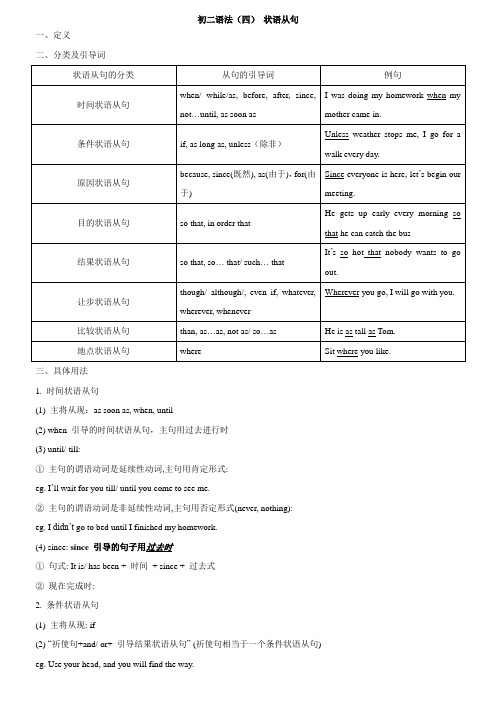
初二语法(四)状语从句一、定义二、分类及引导词三、具体用法1. 时间状语从句(1) 主将从现:as soon as, when, until(2) when 引导的时间状语从句,主句用过去进行时(3) until/ till:①主句的谓语动词是延续性动词,主句用肯定形式:eg. I’ll wait for you till/ until you come to see me.②主句的谓语动词是非延续性动词,主句用否定形式(never, nothing):eg. I didn’t go to bed until I finished my homework.(4) since: since 引导的句子用过去时①句式: It is/ has been + 时间+ since + 过去式②现在完成时:2. 条件状语从句(1) 主将从现: if(2) “祈使句+and/ or+ 引导结果状语从句” (祈使句相当于一个条件状语从句) eg. Use your head, and you will find the way.3. 原因状语从句(1) because> since> as,由why提出的问题用because回来.(2) 对于人们已经知道的事实, 就要用since而不用as或becauseeg. Since the star can show the direction, you can use it help you.4. 结果状语从句(1) 由so…that, such… that引导:①so + adj.+ that: She is so lovely that we all like her.②so+ adj. + a/ an + n. + that: She is so lovely a girl that we all like her.= such + a / an + adj. + n. + that: She is such a lovely a girl that we all like her.③such + adj. + n. (不可数名词, 复数名词)eg. They are such busy people that they don’t have time for their children.It is such spicy food that I can’t bear it.注意: 当名词前有many或much形容时, 用so而不用such.eg. We have so much time that we can finish the work very well.(2) so…that= to… to『状语从句专项练习』一. 用下列方框中的连词填空1.Bob’2.Time passed quickly and three years went by_______ we finished the work.3.The wall of our classroom is _______ white ______ snow.4.I’ll give the note to her _________________ she arrives.5.She didn’t tell me anything _________ she came here.6.Tome didn’t buy the MP5 yesterday________ his aunt said she would buy one for him.7.I’ll go there by bike __________ it doesn’t rain.8.He did not go home _______ he handed in his homework.9.I have learnt a lot ______ I came to this school.10._______ we said goodbye to our parents, we left our hometown.二. 单选1. My uncle has taught _______ he was twenty years old.A. sinceB. forC. untilD. after2. The question is _________ that nobody can answer it.A. very hardB. too difficultC. strange enoughD. so strange3. We don’t have much homework now and our school bags are ______ they used to be.A. as heavy asB. not as heavy asC. as heavily asD. not as heavily as4. It’s quite common in Britain to say “Thank you” to the drivers _____ people get off the bus.A. afterB. sinceC. untilD. when5. ______ they may not succeed, they will try their best.A. ThoughB. WhenC. BecauseD. Unless6. If people _______ cutting down the forest, they will have nowhere ______.A. keep; to live inB. will keep; to live inC. keep; to liveD. will keep; to live7. – Where was your brother at this time last night?- He was writing an e-mail _______ I was watching TV at home.A. as soon asB. afterC. untilD. while8. __________ scientists have done a lot of research on A(H1N1) Flu, There are still some cases for further study.A. AsB. OnceC. IfD. Although9. Don’t laugh at her. She is _________ any of the others in your class.A. as clever a studentB. as a clever student asC. so clever a student asD. so a clever student like10. – Perhaps I’ m going to the market.- Would you get me some juice _________ you’re there?A. sinceB. asC. ifD. after11. Bill won’t make any progress ________ he studies harder than before.A. ifB. whenC. becauseD. unless12. It is difficult for us to learn a lesson in life ________ harder than before.A. whenB. afterC. sinceD. until13. It seemed only seconds _________ the boy finished washing his face.A. whenB. beforeC. afterD. even if14. Ler her do that, ________ she will.A. ifB. unlessC. whetherD. though15. _________ you stay at home, why not do some washing?A. WhetherB. SinceC. IfD. Even if16. I’ll leave him a note _________ he’ll know we won’t come back until 11:00 this night.A. in caseB. in order toC. afterD. so that17. You will be late _________ you leave immediately.A. unlessB. untilC. ifD. or18. It is important _________ you can attend the meeting.A. whileB. thatC. ifD. for19. ________ time went on, my little sister made great progress.A. WithB. SinceC. WhileD. As20. __________ my father will come to the parent meeting is not known yet.A. WheneverB. IfC. BecauseD. That21. __________ I live there are plenty of trees.A. WhenB. IfC. BecauseD. Where22. My John has worked in that small town_______ he left a big city in 2008.A. whenB. afterC. forD. since23. Why do you want a new job _______ you’ve got such a good one already?A. thatB. whereC. whichD. when24. I was drawing on the computer _________ my friend came to see me yesterday evening.A. beforeB. afterC. whileD. when25. The teacher left his office ________ he had finished his work.A. untilB. beforeC. afterD. if26. I know nothing about it _________ my friend told me.A. afterB. ifC. becauseD. until27. Someone called me up in the middle of the night, but they hung up _________ I could answered the phone.A. asB. sinceC. untilD. before28. Nearly two weeks passed _________ I received my father’s letter.A. beforeB. whileC. untilD. as soon as29. The train had left the station _________ I got there.A. as soon asB. by the timeC. sinceD. after30. He met many problems _________ he was going over his lessons.A. beforeB. as soon asC. sinceD. while31. I’d like to go swimming ________ the water is not too cold.A. forB. unlessC. ifD. whether32. May I sit nearer _________ I can see more clearly?A. as ifB. so thatC. even ifD. so33. _________ there were only five soldiers left at the front, ________ they went on fighting.A. Because; soB. If; andC. Though; butD. Though;/34. You can go out, ________ you promise to be back before ten.A. in order thatB. even ifC. as long asD. whenever35. ________ you begin, I think you must continue.A. WhenB. WheneverC. OnceD. Even if36. The students didn’t read English ________ their teacher came in the classroom.A. untilB. beforeC. becauseD. after37. I t’s cloudy. Take an umbrella _______ you leave.A. orB. andC. afterD. when38. You must speak louder _______ you can be heard by all of us.A. orB. so thatC. in order toD. because39. He is ________ a young boy ________ he can’t go to school.A. such; thatB. so; thatC. in order; thatD. as; as40. I’ll give you a new book _______ you finish reading that one.A. beforeB. becauseC. as soon asD. although41. __________ they got to the airport, the plane had already taken off.A. IfB. UnlessC. SinceD. When42. When you read the book, you’d better make a mark _______ you have any questions.A. at whichB. at whereC. the placeD. where43. – Is Bob in the classroom?- Yes, ________ he is on duty today, he must be there early.A. sinceB. untilC. whileD. if44. I’d like to change this pair of shoes, ________ give me my money back.A. soB. orC. butD. and45. We have to get up at 7:15 tomorrow morning, _______ we will be late for the 7:40 train.A. beforeB. orC. ifD. so46. The film “Kung Fu Panda” is ________ interesting _______ I would like to see it again.A. such; thatB. too; toC. as; asD. so; that47. – Would you like to go bike riding with us tomorrow?- Sure, ______ I am busy.A. sinceB. unlessC. whenD. until48.- Will you go camping with us this weekend?- Good idea, if it_______.A. rainsB. will rainC. doesn’t rainD. won’t rain49. It was ________ weather that they decided to go out for a picnic.A. such fineB. such a fineC. so fineD. so fine a50. – What would some students like to do after finishing their education?- They would like to start to work _______ they needn’t depend on their parents completely.A. as soon asB. so thatC. beforeD. while。
(完整)八年级下册状语从句讲解及练习.docx

状语从句用来修主句中的,副和形容的从句叫状从句。
根据其含状从句可分状从句,地点状从句,条件状从句,原因状从句,果状从句,比状从句,目的状从句,步状从句。
1.状从句(1) 状从句常用when, as, while, before, after, since, till, until, as soon as等来引。
.It was raining hard when got to school yesterday.While he was doing his homework, the telephone rang.(2) 在状从句里,通常不用将来,用在表示将来的作或状。
.I ’ ll ring you up as soon as I get to New York.(3) 在有 till 或 until 引的状从句的主从复合句里,如果主句用肯定式,其含是“一直到⋯⋯”,只能用延性。
如果主句用否定式,其含是“直到⋯⋯才⋯⋯” , “在⋯⋯以前不⋯⋯” , 可用瞬。
.The young man read till the light went out.Let ’ s wait until the rain stops.2.条件状从句(1) 条件状从句通常由if, unless 引。
.What shall we do if it snows tomorrow?Don’ t leave the building unless I tell you to.(2) 在条件状从句里,通常用在表示将来的作或状。
.I ’ ll help you with your English if am free tomorrow.He won ’ t be late unless he is ill.(3) 祈“使句+ and (or)+述句” 在意思上相当于一个有条件状从句的复合句。
.:Hurry up, or you’ ll be late.=If you don’ t hurry up, you’ ll be late.Study hard and you will pass the exam.=If you study hard, you will pass the exam.3.原因状从句(1)原因状从句通常由 because, since, as引。
八年级下册状语从句讲解及练习之欧阳治创编

状语从句用来修饰主句中的动词,副词和形容词的从句叫状语从句。
根据其含义状语从句可分为时间状语从句,地点状语从句,条件状语从句,原因状语从句,结果状语从句,比较状语从句,目的状语从句,让步状语从句。
1. 时间状语从句(1)时间状语从句常用when, as, while, before, after, since, till, until, as soon as等连词来引导。
.It was raining hard when got to school yesterday. While he was doing his homework, the telephone rang.(2)在时间状语从句里,通常不用将来时态,用现在时态表示将来的动作或状态。
.I’ll ring you up as soon as I get to New York. (3)在带有till或until引导的时间状语从句的主从复合句里,如果主句用肯定式,其含义是“一直到……时”,谓语动词只能用延续性动词。
如果主句用否定式,其含义是“直到……才……”,“在……以前不……”, 谓语动词可用瞬间动词。
.The young man read till the light went out.Let’s wait until the rain stops.2. 条件状语从句(1)条件状语从句通常由if, unless引导。
.What shall we do if it snows tomorrow?Don’t leave the building unless I tell you to.(2)在条件状语从句里,谓语动词通常用现在时态表示将来的动作或状态。
.I’ll help y ou with your English if am free tomorrow. He won’t be late unless he is ill.(3)“祈使句 + and (or)+ 陈述句”在意思上相当于一个带有条件状语从句的复合句。
八年级下册状语从句讲解及练习之欧阳引擎创编
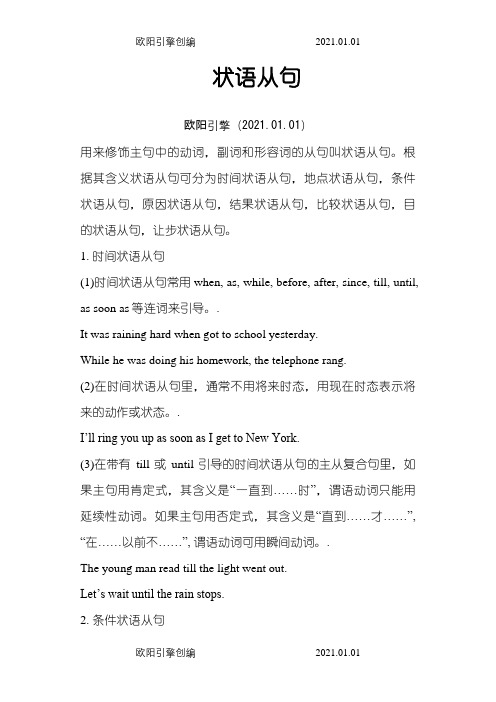
状语从句欧阳引擎(2021.01.01)用来修饰主句中的动词,副词和形容词的从句叫状语从句。
根据其含义状语从句可分为时间状语从句,地点状语从句,条件状语从句,原因状语从句,结果状语从句,比较状语从句,目的状语从句,让步状语从句。
1. 时间状语从句(1)时间状语从句常用when, as, while, before, after, since, till, until, as soon as等连词来引导。
.It was raining hard when got to school yesterday.While he was doing his homework, the telephone rang.(2)在时间状语从句里,通常不用将来时态,用现在时态表示将来的动作或状态。
.I’ll ring you up as soon as I get to New York.(3)在带有till或until引导的时间状语从句的主从复合句里,如果主句用肯定式,其含义是“一直到……时”,谓语动词只能用延续性动词。
如果主句用否定式,其含义是“直到……才……”, “在……以前不……”, 谓语动词可用瞬间动词。
.The young man read till the light went out.Let’s wait until the rain stops.2. 条件状语从句(1)条件状语从句通常由if, unless引导。
.What shall we do if it snows tomorrow?Don’t leave the building unless I tell you to.(2)在条件状语从句里,谓语动词通常用现在时态表示将来的动作或状态。
.I’ll help you wi th your English if am free tomorrow.He won’t be late unless he is ill.(3)“祈使句+ and (or)+ 陈述句”在意思上相当于一个带有条件状语从句的复合句。
- 1、下载文档前请自行甄别文档内容的完整性,平台不提供额外的编辑、内容补充、找答案等附加服务。
- 2、"仅部分预览"的文档,不可在线预览部分如存在完整性等问题,可反馈申请退款(可完整预览的文档不适用该条件!)。
- 3、如文档侵犯您的权益,请联系客服反馈,我们会尽快为您处理(人工客服工作时间:9:00-18:30)。
状语从句用来修饰主句中的动词,副词和形容词的从句叫状语从句。
根据其含义状语从句可分为时间状语从句,地点状语从句,条件状语从句,原因状语从句,结果状语从句,比较状语从句,目的状语从句,让步状语从句。
1. 时间状语从句(1)时间状语从句常用when, as, while, before, after, since, till, until, as soon as等连词来引导。
. It was raining hard when got to school yesterday.While he was doing his homework, the telephone rang.(2)在时间状语从句里,通常不用将来时态,用现在时态表示将来的动作或状态。
.I’ll ring you up as soon as I get to New York.(3)在带有till或until引导的时间状语从句的主从复合句里,如果主句用肯定式,其含义是“一直到……时”,谓语动词只能用延续性动词。
如果主句用否定式,其含义是“直到……才……”, “在……以前不……”, 谓语动词可用瞬间动词。
.The young man read till the light went out.Let’s wait until the rain stops.2. 条件状语从句(1)条件状语从句通常由if, unless引导。
.What shall we do if it snows tomorrow?Don’t leave the building unless I tell you to.(2)在条件状语从句里,谓语动词通常用现在时态表示将来的动作或状态。
.I’ll help you with your English i f am free tomorrow.He won’t be late unless he is ill.(3)“祈使句+ and (or)+ 陈述句” 在意思上相当于一个带有条件状语从句的复合句。
.:Hurry up, or you’ll be late.=If you don’t hurry up, you’ll be late.Study hard and you will pass the exam.=If you study hard, you will pass the exam.3. 原因状语从句(1)原因状语从句通常由because, since, as引导。
.He didn’t come to school because he was ill.As it is raining, we shall not go the zoo.Since you can’t answer the question, I’ll ask someone else.(2)because表示直接原因,语气最强。
Because引导的原因状语从句多放在主句之后。
回答由why提出的问题,只能用because。
As和since语气较弱,一般用来表示明显的原因。
由as和since引导的原因状语从居多放在句首。
.------Why aren’t going there?------Because I don’t want to.As he has no car, he can’t get there easily.Since we have no money, we can’t buy it.(3)because和so不能同用在一个句子里。
4. 结果状语从句(1)结果状语从句由so…that, such…that, so that引导。
.He is so poor that he can’t buy a bike for his son.She is such a good teacher that everybody likes her.My pencil fell under the desk, so that I couldn’t see it.(2)so…that语such...that可以互换。
.在由so...that引导的结果状语从句中,so是副词,与形容词连用。
其结构是: “...so + 形容词(副词)+ that + 从句”。
He was so glad that he couldn’t say a word.The hall is so big that it can hold 2,000 people.Mother lives so far away that we hardly ever see her.5. 比较状语从句比较状语从句通常由as…as, 比较级+ than…等连词引导。
.Tom runs faster than John does. This classroom is as big as that one.6. 目的状语从句(1)目的状语从句通常由so that, in order that引导。
.We started early so that we could catch the first train.He studies hard so that he could work better in the future.We used the computer in order that we might save time.(2)so that既可引导目的状语从句,又可引导结果状语从句。
区别这两种从句的办法有两个:1)目的状语从句里往往带有情态动词can, could, may, might等。
2)从意思上看,目的状语从句往往表示的目的很明确。
.Speak clearly so that they may understand you. (目的状语从句)Jack is badly ill so that he has to rest. (结果状语从句)7. 让步状语从句(1)让步状语从句通常由although, though等连词引导。
Though he is young, he knows a lot.Although I am tired, I must go on working.(2)although(though)不能用在同一个句子中。
.我们不能说:Though it was raining hard, but he still went out.应该说:Though it was raining hard, he still went out.或It was raining hard, but he still went out.8. 地点状语从句地点状语从句常常由where来引导。
Go where you like.Where there is a will, there is a way.一. 选择题1. _______ he’s old, he can still carry this heavy bag.A. ThoughB. SinceC. ForD. So2. ---Do you know if he _______ to play basket ball with us?---I think he will come if he ______ free tomorrow.A. comes; isB. comes; will beC. will come; isD. will come; will be3. In the zoo if a child _____ into the water and can’t swim, the dolphins may come up ______ him.A. will fall; to helpB. falls; to helpC. will fall; helpD. falls; helping4. I don’t remember ________ he worked in that city when he was young.A. whatB. whichC. whereD. who5. We will stay at home if my aunt ________ to visit us tomorrow.A. comesB. comeC. will comeD. is coming6. The police asked the children _______ cross the street ________ the traffic lights turned green.A. not; beforeB. don’t; whenC. not to; untilD. not; after7. I was late for class yesterday _______ there was something wrong with my bike.A. whenB. thatC. untilD. because8. I’ll go swimming with you if I ________ free tomorrow.A. will beB. shall beC. amD. was9. In the exam, the ________ you are, ______ the _______ mistakes you will make.A. careful; littleB. more careful; fewestC. more careful; fewerD. more careful; less10. You should finish your lessons _______ you go out to paly.A. beforeB. afterC. whenD. while11. I hurried _____ I wouldn’t be l ate for class.A. sinceB. so thatC. as ifD. unless12. When you read the book, you’d better make a mark _______ you have any questions.A. whichB. thatC. whereD. though13. The teacher raised his voice _______ all the students could hear him.A. forB. so thatC. becauseD. in order14. He took off his coat _______ he felt hot.A. becauseB. asC. ifD. since15. It is ______ that we’d like to go out for a walk.A. a lovely dayB. too lovely a dayC. so lovely a dayD. such lovely a day16. Mary had ______ much work to do that she stayed at her office all day.A. suchB. soC. tooD. very17. _______ I felt very tired, I tried to finish the work.A. AlthoughB. BecauseC. AsD. As if18. ______ the day went on, the weather got worse.A. WithB. SinceC. WhileD. As19. ______ well you can drive, you must drive carefully.A. So long asB. In order thatC. No matter howD. The moment20. Write to me as soon as you ________ to Beijing.A. will getB. getC. gettingD. got。
